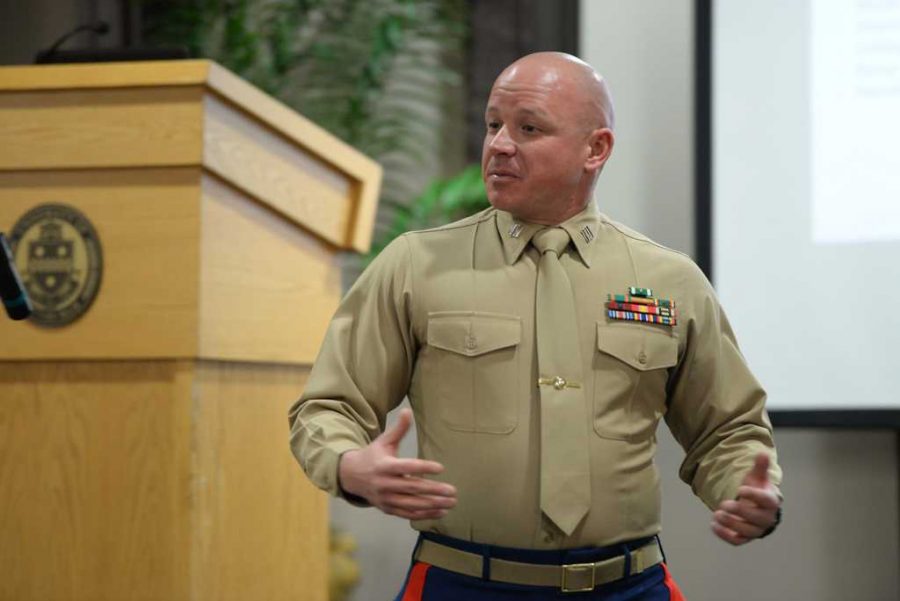Judging by their recruitment advertisements, Marine troops are the epitome of masculinity — musclebound and emotionless.
But the Marines in those commercials do not reflect reality. According to Marine Capt. Brock Budash, few Marine troops fit such a narrow definition of manliness.
Budash spoke in the O’Hara Dining Room Monday night to a crowd of 30 students — mostly men — to tell them that they shouldn’t let society’s expectations for men define who they are.
Pitt’s Interfraternity Council hosted Budash as a part of its Healthy Masculinities Week, a program designed to provoke discussion about what its Facebook page calls “toxic masculinity.”
The week, which the IFC is hosting, will feature co-hosted events with groups, such as Pitt’s Campus Women’s Organization, the Rainbow Alliance and Jewish Women International, to address what it says is a false definition of manhood and manliness. With a series of six events, including two lectures and a documentary screening, the IFC plans to address the social constructs of masculinity, gendered violence and bystander intervention.
At 9 p.m., Budash took the stage in full uniform. He asked the students in the audience what preconceived notions they held about him before they even heard him speak.
“I’m 34 years old, I’m a United States Marine — what do you guys think of me? What perceptions do you have about me, as a Marine or a person?” Budash asked.
The students in the audience responded, yelling out descriptors, such as “tough” and “hardworking.”
Budash then flipped his question and listed stereotypical perceptions society holds of fraternity members.
“What’s my perception of you? All you do is party, throw keggers, right? And in your endeavor to find as many kegs as you can and drink as many red solo cups as you can … all you’re trying to do is get girls, right? You guys are a bunch of sexual harassers, [you’re] no good,” he said.
Some members of the audience shifted uncomfortably and threw each other sideways glances.
But Budash then explained that the vast majority of fraternity brothers don’t come close to matching that stereotype — it’s a small minority giving the rest that label.
“It’s your responsibility to stop [this behavior],” Budash said. “It’s not always easy to do the right thing. It takes courage to stop your best buddy from doing something he shouldn’t be doing … but that’s part of being a man.”
After his lecture, Budash said colleges and males everywhere need to have a conversation about what it means to be a man in 2016.
Halfway through the speech, Matthew Richardson, the coordinator of fraternity and sorority life at Pitt, asked the audience to consider the double standards men and women face.
Richardson, who initially contacted Budash about speaking on campus, proposed a hypothetical scenario in which an adult female teacher has sexual relations with a 16-year-old boy, and no one considers it to be a serious crime.
“Think about if those roles were reversed, and that’s a male teacher, and that’s a 16-year-old girl. Why is it different?” Richardson asked.
Budash answered before anyone in the audience could.
“I’ll tell you why it’s different: perception,” he said.
Justin Horowitz, a sophomore marketing and global management double major and president of the Interfraternity Council, introduced Budash to the audience. Following the lecture, Horowitz said Budash’s status as a decorated Marine made his message stronger.
“The definition of masculinity needs to be redefined,” Horowitz said. “It’s hard for men to be themselves all the time because of how society perceives the typical man.


